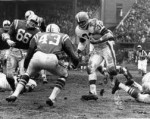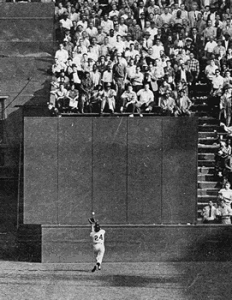How to Enjoy Sports Even When Your Teams Have a History of Failure

Jim Brown carrying the ball vs. the Colts, Dec. 27, 1964. He gained 114 yards on 27 carries in the title game; photo courtesy Cleveland.com

My dad’s season tickets were in Section 42 of Cleveland’s old Municipal Stadium, so this now collectible ducat would have placed its bearer near us, in Section 40. Photo courtesy SCP Auctions.
I grew up in Cleveland, which has a sad history of failure in team sports that rivals that of any city in North America. The Indians in baseball, the Cavaliers in basketball, and the Browns in football have each come tantalizingly close to winning championships in my lifetime, but only once did a local team manage to win the final, crowning game of a season. That was in 1964, when the Browns led by the great running back Jim Brown won the NFL title, defeating the Baltimore Colts led by Hall of Fame quarterback Johnny Unitas, 27-0. The game was a scoreless shut-out at halftime, but in the second half Browns QB Frank Ryan threw three TD passes to split end Gary Collins, and the route was on. Municipal Stadium became a scene of joyous bedlam. This was two years before the Super Bowl was inaugurated, and since then the Browns have never made it back to the title game.
I was in the stands at Cleveland’s Municipal Stadium on that frigid day on December 27, 1964, when the Browns faced the Colts, sitting in the stands with my father Earl, and brother Joel, now both sadly gone. I was ten years old. Our dad Earl was an extremely knowledgeable sports fan, and in fact had had youthful ambitions to be a sportswriter, though he ended up buying and selling scrap metal as a profession, a pretty common field for the son of Jewish immigrants in the first half of the twentieth century (see such examples of this prevailing sociology as the uncle of the eponymous protagonist in Mordecai Richler’s classic novel The Apprenticeship of Duddy Kravitz, also an excellent film written by Richler, starring Richard Dreyfuss). But Earl never lamented his years in the metals industry, instead channeling his knowledge and savvy sports spectatorship into his three kids, including our sister Pamela, teaching us how to appreciate key plays in sports, and how to enjoy the subtle games of strategy, the parry and thrust that’s always made sports fascinating for me to watch, experience, and follow. A favorite expression of his for me to hear, one he frequently made, uttered, say, when a pitcher leapt off the mound to field a bunted ball and in tossing his throw toward first base, plunked it off the back of the baserunner, prompting Earl to say, “Wow, I’ve never seen that happen before!”
Earl had earlier enjoyed another Cleveland sports championship, in 1948, when the Indians won the second World Series in their history, the first having come in 1920, when he was two years old. When I was born, on September 22, 1954. the Tribe had just completed a remarkable regular season, when they won 111 games and were about to enter the World Series against the NY Giants as heavy favorites. Sadly, they were swept four straight by the Giants. The opener of the series in which Willie Mays made his remarkable play, now known simply as “The Catch,” occurred on Sept. 29, probably the day before my br’it meilah, the ritual circumcision that for Jewish families occurs eight days after the birth of a male child. Though I have no memory of that day I have long imagined my dad’s elation at the arrival of his third child and the crushing defeat his baseball team endured that autumn.
With all that as backdrop, I have been following with great interest and enjoyment the Euro Cup soccer tournament that started a few weeks ago. When I was in Toronto last week, ethnic neighborhoods, like Little Portugal, were consumed with anticipation the day of a game. There have been some great matches, amazing plays, and surprising outcomes, like when England defeated Sweden 3-2 in a come-from-behind win on an amazing back-of-the-foot goal late in the second half. In England’s next match, they beat Ukraine 1-0, but only after what appeared to be the equalizer by Ukraine was judged to not have fully crossed the goal line, a call which replays later showed quite definitively to have been incorrect by the referee. During that tense match, Michael Goldfarb, former NPR correspondent, currently London correspondent for Global Post, and an author whose New York Times Notable Book, Ahmad’s War, Ahmad’s Peace: Surviving Under Saddam, Dying in the New Iraq, I edited and published with him in 2004–visited a North London pub to ask English fans how they were feeling about their team. In his excellent article, he chronicles the predominant history of failure that has hung for decades over the nation’s football team, and interviews fans who really open up about what it’s like rooting for a blighted team.
“The team takes the field and after sporadic hoarse cries of, ‘C’mon England!’ a silence descends on the crowd. This is the epitome of the English fan experience—the total silence in which the crowd suffers. The essence of watching a championship in any bar in America is the kibitzing among strangers. The jokes, the barracks humor, are part of what makes it fun. Fun is not part of the picture here. . . . I start chatting with a skinny guy who has managed to perch on the windowsill just where I’ve been standing. It’s no more than 5 inches deep. ‘Are you suffering yet?’ I ask. ‘I’m an England fan, I have to suffer.'”
Well, somehow, they beat Ukraine, even if the win was tainted by the bad call, and their next match is against Italy. So, maybe England will continue advancing through this tournament. And, maybe the Cleveland Indians, who won a game with a walk-off HR Tuesday night, and are somehow in first place in their division, will find a way to get into the post-season. Oh, well, we fans chastened by loss, never lose our capacity to dream.


